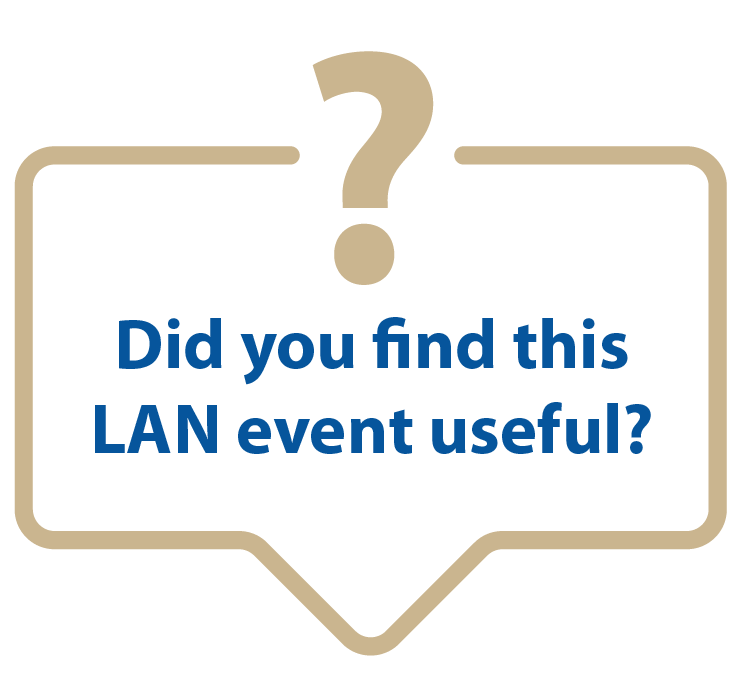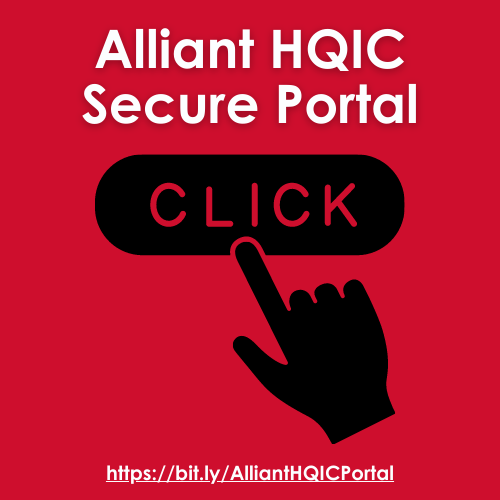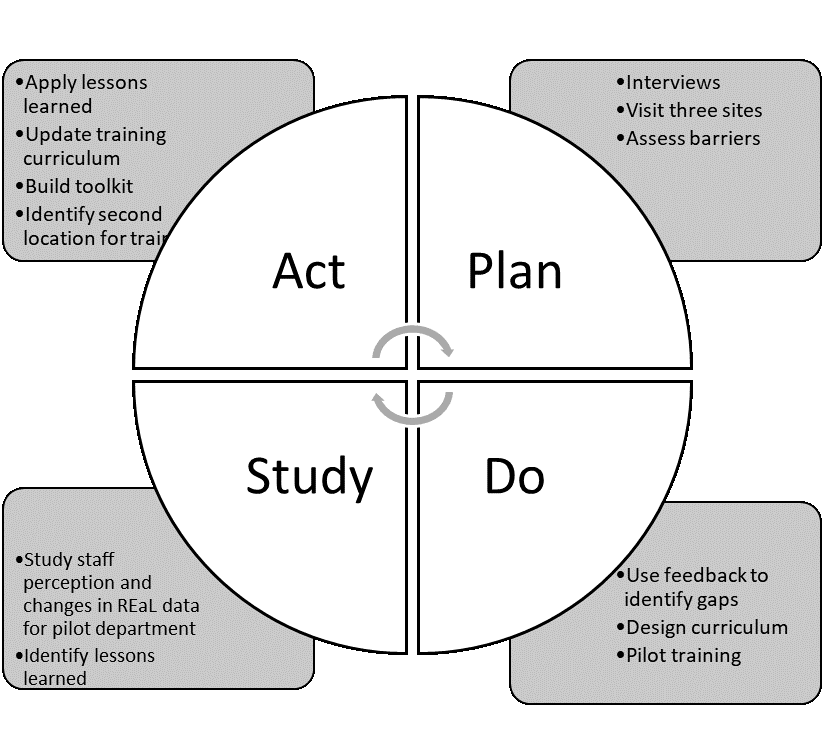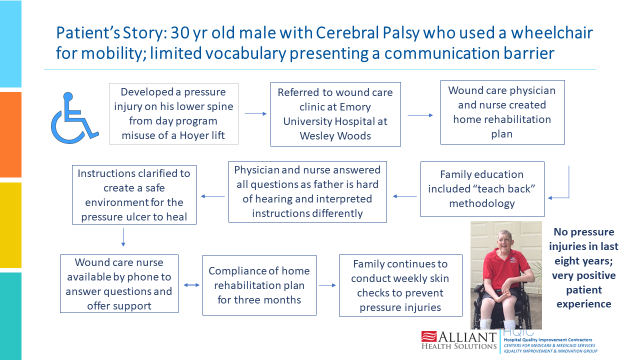|
|
|
|
This monthly newsletter highlights the latest insights, resources, and evidence-based best practices.
Our hope is that this newsletter makes it easy for you to stay on top of trends and allows you to provide the best possible care for those you work with and serve.
|
|
|

COVID-19's Impact on Healthcare-Associated Infections in 2021
A new Centers for Disease Control and Prevention (CDC) analysis reveals continued increases in healthcare-associated infections (HAIs) in U.S. hospitals during 2021, the second year of the COVID-19 pandemic. Data from the CDC’s National Healthcare Safety Network (NHSN) show a significantly higher incidence of central line-associated bloodstream infections (CLABSIs), catheter-associated urinary tract infections (CAUTIs), ventilator-associated events (VAEs), and MRSA bacteremia in 2021 compared to 2019.

Quarterly national standardized infection ratios (SIRs) for select HAI types are shown in the graph above. This graph displays SIR point estimates from 2019-Q1 through 2021-Q3 and does not constitute a statistical trend analysis.
These increases corresponded with periods of high COVID-19 hospitalizations and were especially elevated during the first and third quarters of 2021. Data also revealed strong declines in Clostridioides difficile (C. diff), likely due to pandemic-related improvements in hand hygiene, personal protective equipment practices and environmental cleaning in health care settings. Read the Article
|
Upcoming Learning and Action Network (LAN) Events
Infection Prevention Back to Basics: Multi-Drug Resistant Organisms (MDROs)
Thursday, July 28, 2022, at 1 p.m. ET
Join us for part three of the Preventing Healthcare-Associated Infections (HAIs) Learning & Action Network Series. This dynamic webinar will share strategies for getting “back to basics” when it comes to preventing MDROs, particularly hospital-onset C. difficile and Methicillin-Resistant Staphylococcus Aureus (MRSA) bacteremia. Additionally, we will discuss methods for integrating the patient voice into infection prevention.
View Agenda | Register Here
Sepsis Care in 2022: Identification and Management Strategies to Optimize Patient Outcomes
Thursday, August 25, 2022, at 1 p.m. ET
The objectives of this webinar are to:
- Summarize the four-tier process for effective sepsis program development
- Examine the evidence for the sepsis bundles and share proven strategies to resolve barriers in implementation and measurement.
- Identify gaps between the evidence and your hospital’s sepsis program
Register Here
Past Learning and Action Network (LAN) Events
Moving Forward Using Lessons Learned to Prevent Central Line-Associated Bloodstream Infections (CLABSI)
Recorded on June 23
This dynamic webinar featured proactive strategies and tools for preventing all-cause harm related to CLABSI. Participants also learned about a hospital’s success with engaging leaders, providers and front-line staff in a hospital-wide initiative to drive down device utilization, increase bundle compliance and improve outcomes.
View Slides
View All Upcoming Events Here

If Yes, Click Below.
Click here if you attended the June LAN event and were able to "use tomorrow" what you heard during the webinar.
View All Previous LAN Event Recordings
Community of Practice (CoP) Calls
CMS hosts CoP calls on the second Thursday of each month at 1 p.m. ET | 12 p.m. CT | 11 a.m. MT | 10 am. PT. The calls are open to all Alliant HQIC hospitals.
Optimal Z Code Utilization and Reimbursement Opportunities
Thursday, July 14
Join Health Services Advisory Group and the HQIC community as we summarize the impact of COVID-19 on CLABSI, discuss lessons learned, and review the importance of CLABSI best practices with facility-specific examples of how to control device utilization, bundle compliance and associated infections.
Register Here
Monthly Office Hours-IP Chat
Alliant Health Solutions hosts this chat on the 4th Wednesday of every month from 2-2:30 p.m. ET
 IP Chats are monthly networking events to build knowledge, share experience and provide support for hospital infection preventionists. For more information, visit the Alliant website. Questions? Contact Amy Ward at amy.ward@allianthealth.org. IP Chats are monthly networking events to build knowledge, share experience and provide support for hospital infection preventionists. For more information, visit the Alliant website. Questions? Contact Amy Ward at amy.ward@allianthealth.org.
Register for each of the following sessions. Please register for each event individually:
- Wednesday, July 27, 2022, at 2 p.m. ET
- Wednesday, August 24, 2022, at 2 p.m. ET
- Wednesday, September 28, 2022, at 2 p.m. ET
- Wednesday, October 26, 2022, at 2 p.m. ET
|
 Alliant HQIC Online Portal Alliant HQIC Online Portal
Access the Alliant HQIC portal to view your assessments and measurement data, and chat with other HQIC-enrolled hospitals to share best practices, barriers and solutions. Download Portal Instructions to Get Started
Coaching Packages
Check out the best practice interventions with associated resources for adverse drug events, hospital-associated infections, antibiotic stewardship, pressure injures, sepsis, readmissions, health equity and patient and family engagement. Available on the Alliant website
Behavioral Health/Opioid Stewardship
IT-Based Support To Reduce Opioid Addiction
The CHIME Opioid Playbook was created to help CIOs and CMIOs develop a program to help their providers, health care organizations, and patients succeed. The playbook provides a framework to build IT-based support for launching and maintaining system-wide initiatives to reduce the disease of opioid addiction. It is based on the knowledge, experience and insights from the diverse membership of CHIME and CHIME Foundation partners, with real-world examples, best practices and links to valuable resources. The playbook is tailored to CIOs and CMIOs who serve as members of their organization’s opioid stewardship committee, but others may find it useful in understanding technology’s role in creating a solution. Get the Playbook
AHRQ Stats: Any Use and Frequent Use of Opioids Among Elderly Adults in 2018-2019, by Socioeconomic Characteristics
In 2018 and 2019, 15.8% of elderly adults filled at least one outpatient opioid prescription during the year, and 4.9% obtained five or more prescriptions in the same time period. (Source: AHRQ, Medical Expenditure Panel Survey Statistical Brief #541) Learn More
Wellstar West Georgia Medical Center Offering Acute Withdrawal Management Services for Alcohol and/or Opioid Addiction
Wellstar West Georgia Medical Center partnered with Evergreen Healthcare Partners to develop an inpatient three- to five-day acute withdrawal management service for adults requiring medical management of withdrawal symptoms. Read More
Patient Safety
Safety Awareness
Declaration to Advance Patient Safety
In May, the National Steering Committee for Patient Safety (NSC) issued the Declaration to Advance Patient Safety to urge health care leaders across the continuum of care to recommit to advancing patient and workforce safety. The NSC called for immediate action to address safety from a total systems approach, as presented in the National Action Plan to Advance Patient Safety, and implored leaders to adopt safety as a core value and foster collective action to uphold this value. Read More
Adverse Drug Events
From the Office of Inspector General: Adverse Events in Hospitals
Twenty-five percent of Medicare patients experienced patient harm during their hospital stays in October 2018. Patient harm includes adverse events and temporary harm events. The most common type of harm event was related to medication (43%), such as patients experiencing delirium or other changes in mental status. Read the Report
Antibiotic Stewardship
Survey Finds Most Primary Care Docs Would Treat Asymptomatic UTIs With Antibiotics
Fully 70% of primary care physicians say that they would prescribe antibiotics for patients who are asymptomatic for urinary tract infections (UTIs) when urine culture results are positive for bacteria, a new survey has found. Read the Article
Pressure Injuries
Walk with the WOC and Step into a Brighter Future of Pressure Injury Prevention
See the April 26, 2022, LAN event, Walk with the WOC and Step into a Brighter Future of Pressure Injury Prevention, for a slide presentation of Emory Hillandale’s performance improvement process, including decision trees and change path for key takeaways and intervention strategies.
Sepsis Awareness
Educating the Community About Sepsis
According to the Sepsis Alliance, sepsis kills over 300,000 people per year. Yet only 65% of people are even familiar with the term. How can your facility make an impact in your community? Check out the tools in the Sepsis Alliance Sepsis 911 Community Education toolkit. The toolkit contains an education slideshow and script, Sepsis 911 video, customizable poster, promotion materials and attendee pre- and post-event quizzes.
Patient and Family Engagement
The Power of Patient Stories for Improving the Patient Experience
AHRQ hosted a webcast that gave an overview of the Consumer Assessment of Healthcare Providers and Systems. The event focused on narrative item sets and how these narratives can provide insights into patient experiences with care that are not captured via closed-end survey questions. Learn how patient narratives can help health care organizations address challenges and achieve successful quality improvement initiatives. Visit Website
Health Equity
Alliant Health Solutions' health equity lead, Rosa Abraha, curated the following health trainings, events and resources related to health equity. Check out the resources listed below.
- Video: Utilizing the Social Vulnerability Index to Identify Community Needs. Presented by Bruce Spurlock, MD, president and CEO of Cynosure Health. Watch Recording
- Study: Does Racism Impact Healthcare Quality? Perspectives of Black and Hispanic/Latino Patients. This study shows that Black and Hispanic/Latino patients who experience racism in health care report worse views on the quality of their care and lower trust in their clinicians. These findings suggest that eliminating racism at the organization and clinician level may improve the quality of care for patients of color. Read the Study
American Hospital Association Launches Health Equity Roadmap
The Health Equity Roadmap, which builds on the goals established by the National Call to Action to Eliminate Health Care Disparities and AHA’s #123forEquity Pledge, is designed to meet hospitals and health systems where they are on their equity journey. It includes customized resources and action plans, among other support tools, to guide organizations throughout the transformation process. Visit the Health Equity Roadmap webpage
Readmissions/Care Transitions
Stratifying Hospital Readmissions Reduction Program Improved Equity
According to a Health Affairs study, implementing stratification within the Medicare Hospital Readmissions Reduction Program helped improve health equity by decreasing penalty rates for safety-net hospitals, rural hospitals and health systems that provide care for racial minorities. Read Study
Analysis of Hospital-Level Readmission Rates and Variation in Adverse Events Among Patients With Pneumonia in the United States
Hospital readmission rates are an important indicator of patient safety. A cross-sectional study examined whether patients admitted to hospitals with high readmission rates also had higher risks of in-hospital adverse events. Based on a sample of over 46,000 Medicare patients with pneumonia discharged between July 2010 and December 2019 and linked to Medicare adverse event data, researchers found that patients admitted to hospitals with high all-cause readmission rates were more likely to experience an adverse event during their admission. Read Article
|
COVID-19 Care
Alliant Health Solutions’ Resource Compilation
Throughout our work as a strategic partner in the National COVID-19 Resiliency Network, Alliant produced several flyers, videos and educational sessions for communities across the United States and U.S. territories. Click Here for a compilation of all these resources available in one place.
|
Hospital Heroes
Archbold's Grady General Hospital Receives Top Safety Score
In a recent nationwide report known as the Hospital Safety Score, The Leapfrog Group awarded Archbold's Grady General Hospital in Cairo, Ga., a grade of 'A' for the hospital's performance based on patient outcomes.
The Leapfrog Group, an independent nonprofit organization, uses a grading system of A, B, C, D and F to rate hospitals based on over 30 national performance measures reflecting errors, injuries, accidents and infections.
"Patients who enter our doors know that our team of physicians and clinicians will provide high-quality and safe care," said Crystal Wells, administrator at Archbold's Grady General Hospital. "It's rewarding to see our staff's efforts recognized nationally, and I'm so proud of what our team has accomplished."
The Leapfrog Hospital Safety Grade is the only hospital rating program based exclusively on hospital prevention of medical errors. The grading system is peer-reviewed, fully transparent and accessible to the public. Read the Article
|
Success Stories
Jefferson Healthcare Shares Health Equity Journey
Jefferson Healthcare is a 25-bed critical access hospital in Port Townsend, WA. Even though this hospital is small, its impact on health equity for its patient population is mighty. critical access hospital in Port Townsend, WA. Even though this hospital is small, its impact on health equity for its patient population is mighty.
Jefferson Healthcare’s journey in health equity began in 2013 when a Patient and Family Advisory Council was created and later transformed into an Equity Committee. Since then, the hospital has developed an Equity Dashboard, participated in the IHI Pursuing Equity Learning and Action Network and now has health equity as a strategic priority. See timeline.

This strategic priority is led by Dunia Faulx, MPH, director of population health and care transformation, who leads the Health Equity committee and makes every effort to use health equity data to identify gaps or disparities in care. An improvement opportunity was quickly realized with the actual collection of Race, Ethnicity and Language (REaL) patient data, and the goals were:
- Decrease the “other” response by 25%.
- Create a training toolkit.
- At least 90% of staff complete training.
See an example of Jefferson Healthcare’s Plan-Do-Study-Act cycle for improvement.

Lessons learned during the Study phase that were considered for the next PDSA cycle included:
- Inconsistent process/emphasis on asking for race, ethnicity and language data
- Belief that once a patient is in the system, the information does not need to be reassessed
- Staff missing the connection to the ‘why’
- Lack of standard onboarding and training materials in all departments
- Staff Concerns: offending patients, assuming patients don’t want to answer, don’t want to put anyone on the spot
Jefferson Healthcare’s health equity journey has been successful due to its strategic priorities, committee members and dedication to quality improvement. Other keys to success include:
- Start small and celebrate often
- Leadership support and vision are vital
- Involve patients, staff and the community
- Data-driven approach
- When it feels uncomfortable, lean into the conversation
See the Alliant HQIC website for Jefferson Healthcare’s presentation and recording and the change path for key takeaways, implementation strategies and resources.
Georgia Hospital Maintains Zero Rate for Hospital-Acquired Pressure Injuries
Emory Hillandale, a 100-bedhospital
located on the eastern perimeter of Atlanta, is part of Emory Healthcare, Georgia's most comprehensive academic health system. The leadership team at Emory Hillandale empowered the Wound, Ostomy and Continence (WOC) nurse to own the process of reducing hospital-acquired pressure injuries. Fran Perren MSN, BSW, RN, NEA-BC, CWOCN, is the unit director of WOC Services at Emory Decatur/LTAC/Hillandale and led the hospital teams to maintain zero rates. Fran’s performance improvement process includes:
- Determine at-risk population
- Develop a skin prevention bundle for at-risk patients
- Provide simple decision trees for clinicians
- Form a bedside team to lead the way:
- Teach proper intervention
- Measure compliance of intervention
- Become a unit resource for skin management
- Discuss barriers to performance improvement
- Celebrate all wins
Along with ongoing leadership support and guidance, successful outcomes are also attributed to bedside teams. Teams receive train-the-trainer education, instruct at the quarterly Skin Competency Skills Fair, conduct monthly prevalence audits, and participate in performance improvement initiatives.
Photos are of bedside teams celebrating achievements. Both Emory Hillandale and Emory Decatur are maintaining zero rates.
Patient and family education is also vital to successful patient outcomes. Kathy McGowan, MPH, patient advocate and former vice president of quality and safety at the
Georgia Hospital Association, shared her son Michael’s story of how teach-back methodology led to a positive patient experience.

See Alliant’s website for the April 26 LAN presentation and recording and the Change Path for key takeaways and implementation strategies.
|
|
|
Connect with us!
    Click here if you'd like to share your corporate profiles with us and we'll connect with you!
Click here if you'd like to share your corporate profiles with us and we'll connect with you!
|
| |
Hospital Quality Improvement Project Collaborators


|
| |
For more information about Alliant Health Solutions, visit the website: www.allianthealth.org
For questions or information about free technical assistance, please contact:
Share this email with a friend or colleague:  
|
|
|
|
|